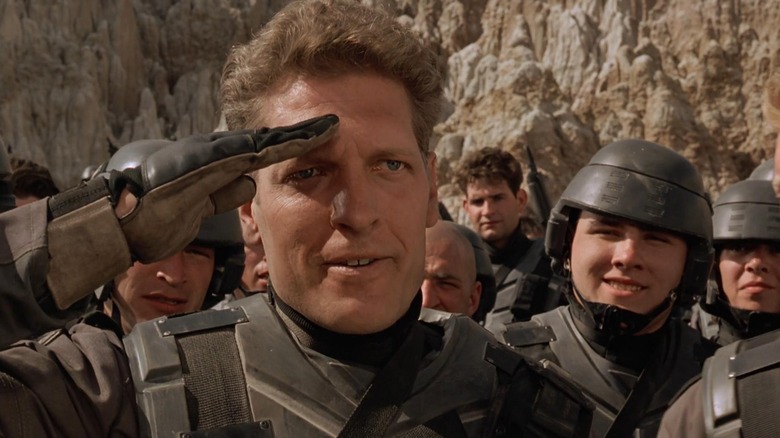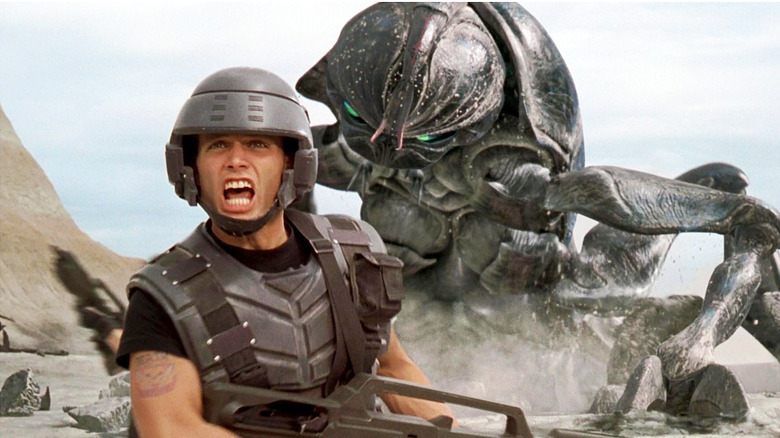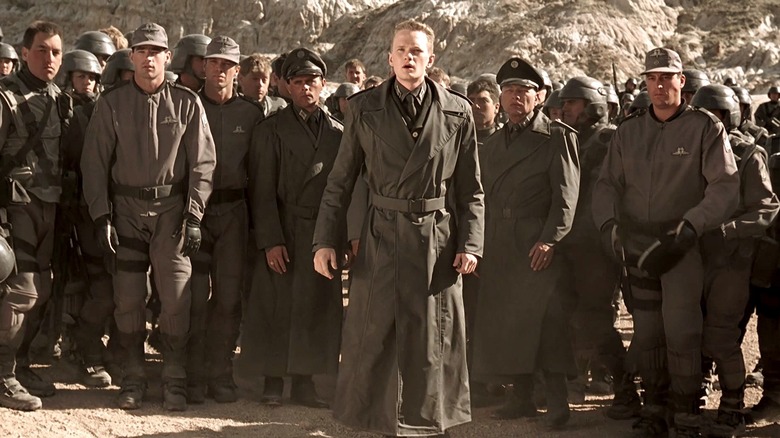Paul Verhoeven Credits Chaos At Columbia Pictures For Starship Troopers Getting Made
Paul Verhoeven grew up in the Nazi-occupied Netherlands and that's why he and his films have such a distaste for authoritarians. Even with years spent working in the U.S., the filmmaker has never adopted the black and white moral framing of America. "I have a hard time believing in all these hero stories," he once told The Independent.
Verhoeven was especially repelled when he tried to read "Starship Troopers," Robert Heinlein's novel where humanity has become an interstellar empire. The director recalled to Empire, "I stopped after two chapters because it was so boring. It is really quite a bad book... It's a very right-wing book." So what did Verhoeven do with the book he couldn't even finish? Why, make a movie out of it, of course.
As /Film's Erin Brady has written about, Verhoeven and his screenwriter Ed Neumeier decided their "Starship Troopers" wouldn't be just an adaptation of the novel, but a scathing critique of it. Unless you're at the absolute right-wing of the political spectrum, it should be clear that the future of "Starship Troopers" is dystopian. Humanity is locked in wars of aggression, and if you don't serve in them, you aren't a citizen and can't vote. Yet the movie presents this through a lens of ironic optimism. The film's denouement is a recruitment ad, depicting the film's surviving main characters all fully indoctrinated, now being used as props to make the next generation of soldiers.
"Starship Troopers" uses tropes from American action and military films to tell its story: the plucky and handsome hero, the unknowable enemies, and the happy ending. In doing so, the movie exposes how such storytelling springs from the same fascist root as outright propaganda, like the ones Verhoeven would've been force-fed as a child.
Chaos at Columbia
The contempt in "Starship Troopers" for the military and Hollywood, two of America's biggest institutions, should be clear by now. So the question becomes, how did the movie get made in the first place, especially by a major Hollywood studio? Under normal circumstances, it wouldn't have.
Per contemporary reporting by the Los Angeles Times, Columbia Pictures' parent Sony Pictures Entertainment was in the midst of "re-engineering" in 1997, when "Starship Troopers" hit theaters. Sony Pictures chief Alan Levine had resigned the previous year, and new management hadn't quite gotten the reigns yet. The company even commissioned "Time for a Change," a 12-minute video featuring Tom Cruise, which promised better days ahead for Sony employees.
Verhoeven recalled to The Guardian that, due to this upheaval, "We slipped through the net."
It's a good thing that they did. The satirical edge of "Starship Troopers" would be dulled if it didn't look like the blockbusters it was lampooning. When Columbia realized what they had on their hands, though, they weren't exactly pleased. When executives noted the similarities between the flags of Nazi Germany and the Terran Federation, Verhoeven replied "No ... it's completely different [colors]."
Producer Jon Davison still had the movie pushed back from July to September, knowing how poorly it would fair against an un-ironically patriotic blockbuster like "Air Force One." Verhoeven, for his part, was in for a rude awakening.
Reception and reevaluation
"Starship Troopers" barely broke even at the box office. Critics weren't anymore appreciative than audiences, with many reading the film as an endorsement of the politics it was critiquing. Verhoeven bemoaned this to Empire:
"We were accused by the Washington Post of being neo-Nazis! It was tremendously disappointing. They couldn't see that all I have done is ironically create a fascist utopia."
That libel must have strung extra hard for Verhoeven, given his childhood. Now, if you only watch a movie once, you can be left uncertain if it's being ironic or sincere. That said, Verhoeven is the man who made "Robocop," one of the biggest cinematic middle fingers to Ronald Reagan this side of "They Live." Critics really should've known better, but they're only a fraction of the audience. Speaking to The Guardian, Verhoeven elaborated on why he thinks the film failed with viewers:
"With a title like 'Starship Troopers', people were expecting a new 'Star Wars.' They got that, but not really: it stuck in your throat. It said: 'Here are your heroes and your heroines, but by the way – they're fascists.'"
Indeed, "Starship Troopers" was simply made at the wrong time. The 1990s were a time of peace and prosperity. It was the decade Francis Fukuyama published "The End of History," arguing humanity had achieved the final form of governance: liberal, capitalist democracy. In the 2020s, it's now clear such political battles are not over and the retrograde ideologies of Verhoeven's youth have reared their ugly heads. Even though "Starship Troopers" celebrated its 25th anniversary this year, it feels downright urgent.
The business necessities of filmmaking have often been a restraining bolt on artists. Sometimes when that bolt is loosened by circumstance or negligence, something great emerges. "Starship Troopers" is exempli gratia.


